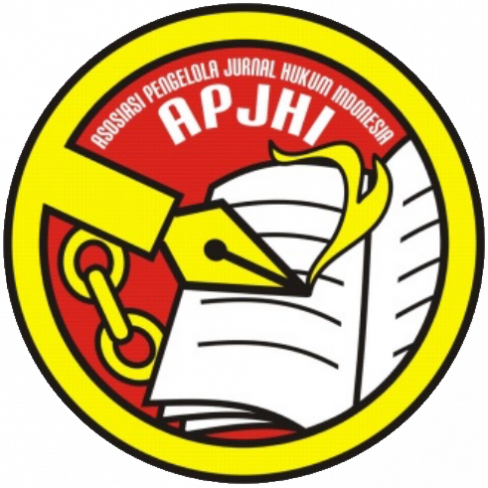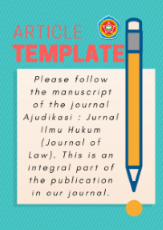Bantuan Dana Bank Dunia Dalam Perspektif Pemenuhan Hak-hak Ekosob: Studi Kasus Pada Sektor Pendidikan di Indonesia
DOI:
https://doi.org/10.30656/ajudikasi.v2i2.692Abstract
The World Bank assistance in the education sector in Indonesia as a developing country faced with an interest in the fulfillment of the right to education in the perspective of Economy, Social, and Culture (ESC) rights for the society. For Indonesia, World Bank assitance must be in line with the national regulation, therefore harmonization into national law is necessary. The World Bank assistance is aimed at accelerating free trade, and the achievement of global education standards for the recipient countries. Thus, the alignment of the education sector with the interests of the economy and the free market may threaten the education rights of Indonesian citizen. This article will focus on the fulfillment of education right in Indonesia. Seeing the facts from the background, the formulation of the problems raised in this legal research are: (1). characteristics of educational assistance by the World Bank for developing countries. (2). Compatibility between World Bank assistance standards with the fulfillment of ESC rights in education in Indonesia. The purpose of this research is to analyze the characteristics of educational assistance by the World Bank for the third world countries and the suitability of the World Bank assistance to the fulfillment of ESC rights in education in Indonesia. This article based on the normative legal research method, and employs the statute and conceptual approach. It is found two results. First, the World Bank assistance to the education sector has been implemented in several countries, including Indonesia. The fulfillment of the right to education in developing countries have been experiencing an intervention and support from the World Bank. The World Bank asisstence is aim at achieving the goal of education, and to ensure the aid has been allocated for education projects, and to provide students with global education standards. Second, by employing the SABER standard with 4-a method to measure the suitability of the World Bank assistance in the fulfillment of the right to education in Indonesia, it is found that there remain a problem in the ‘acceptability’ standard. The World Bank should give more weights to the local wisdoms when providing asisstence in the recipient country.
Downloads
References
Buku
Aldhof, Huala, “Hukum Ekonomi Internasional: Suatu Pengantarâ€, Keni Media, Bandung, 2010.
Asplund, Knut D., et.al, “Hukum Hak Asasi Manusiaâ€, PUSHAM UII, Jogjakarta, 2008.
Bank Dunia, “Achieving the Learning For Alâ€l, The World Bank Press, New York, 2013.
---------------, “Priorities And Strategies for Education; A World Bank Reviewâ€, The World Bank Publisher, Washington D.C., 1995
---------------,â€SABER Overview; The What, Why, and How of the Systems Approach for Better Education Resultsâ€, The World Bank Press,New York, 2013.
---------------, Independent Evaluation Group Review; Indonesia-BOS Knowledge Improvement For Transparency And Accountability (Report No: ICRR14275), The World Bank Publisher, Washington D.C., 2013.
---------------, Project Information Document (PID) Identification/Concept Stage; KIAT GURU: Kinerja dan Akuntabilitas Guru “Improving Teacher Performance and Accountabilityâ€(Report No:PIDC56822), The World Bank Publisher, Washington D.C., 2016
Bernstein Tarrow, Norma, et.al, “Human Rights and Educationâ€, Pergamon Press, Oxfordshire, 1987
Cole, Mike, “Education, Equality and Human Right: Issues of Gender, Race, Sexuality, Disability and Social Classâ€, Routledge, Oxfordshire, 2006.
Couret Blanco, Manuel, “Economic Versus Human Rightsâ€, Routledge, New York, 2009.
Dieter Beiter, Klaus, “The Protection of the Right to Education by International Lawâ€, Martinus Nijhoff Publisher, Leiden, 2006.
Independent Evaluation Group, “From Schooling Access to Learning Outcomes; an Unfinished Agendaâ€, The World Bank Press, Washington DC, 2006
J. Kless, Steven, et.al, “Economy, Aid, and Educationâ€, Sense Publisher, Rotterdam, 2006.
Khaliq, Urfan dan Robin Churchill, et.al, “UN Human Right Treaty Bodies; Law and Legitimacyâ€, Cambridge Publisher, New York, 2012.
Langford, Malcolm, “Social Right Jurisprudence; Emerging Trends in International and Comparative Lawâ€, Cambridge University Press, New York, 2009.
N Shaw, Malcolm, “International Law (6th edition)â€, Cambridge University Press, New York, 2008.
Peter Mahmud Marzuki, Penelitian hukum, Kencana Prenada Group, Jakarta, 2005.
PBB, “Economic, Social and Cultural Rights; Handbook for National Human Rights Institutions (Professional Training Series No.12)â€, UN Publishing, New York, 2005.
-----, “Human Right Indicators; A Guide to Measurement and Implementationâ€, UNHR Office of the High Commition, New York, 2012
Parkinson, Nancy, “Education Aid and National Development; an International Comparison of the Past and Recommendations for the Futureâ€, Macmillan Press, New York, 1976.
Rukmini, Mimin, et.al, “Pengantar Memahami Hak EKOSOBâ€, Pusat Telaah dan Informasi Regional (PATTIRO), Jakarta, 2006.
Sieghart, Phillip, “The International Law of Human Rightâ€, Clarendon Press, Oxfordshire,1983.
Spring, Joel, “The Universal Right to Education; Justification, Definiton, and Guidelinesâ€, Lawrence Erlbaum Associates, inc., London
Ssenyonjo, Manissuli, et.al., “International human Right Law; Six Decades after the UDHR and Beyondâ€, Ashgate Publishing, Burlington, 2010.
Steven J. Kless, et.al., “The World Bank and Education; Critiques and Alternativesâ€, Sense Publisher, Roterdam, 2012.
Saavedra, Jorge, “Education financing developing countries: level and sources of funds†, The World Bank Press, Washington DC, 2002.
UNICEF, “A Human Right-Based Approach to Education for All: a Framework for the Realization of Children Right to Education and Right Within Educationâ€, United Nation Children’s Fund, New York.
W. Jones, Phillip, “World Bank Financing of Education: Lending, Learning, and Developmentâ€, Routledge, New York, 2007.
Wößmann, Ludger & Erick. A Hanusek, “Education Quality and Economic Growthâ€, The World Bank Publisher, Washington D.C, 2007.
Internet
IMF, “History of Bretton Woods Agreement 1944; Cooperation and Recostruction (1944-71)â€, Washington DC, 2008, pada https://www.imf.org/external/about/histcoop.htm, diakses pada 10 Agustus 2018.
PBB, “World Economic Situation and Prospectâ€, 2012, pada http://www.un.org/en/development/desa/.../2012country_class.pdf , diakses pada 25 Nopember 2016
Kamus
Henry Campbell Black, “Black’s Law Dicitionaryâ€, West Group, St. Paul, 1999
Downloads
Published
Issue
Section
License
Authors who publish with this journal agree to the following terms:
Authors retain copyright and grant the journal right of first publication with the work simultaneously licensed under a Creative Commons Attribution License that allows others to share the work with an acknowledgment of the work's authorship and initial publication in this journal.
Authors can enter into separate, additional contractual arrangements for the non-exclusive distribution of the journal's published version of the work (e.g., post it to an institutional repository or publish it in a book) with an acknowledgment of its initial publication in this journal.
Authors are permitted and encouraged to post their work online (e.g., in institutional repositories or on their website) before and during the submission process, as it can lead to productive exchanges and earlier and greater citation of published work.
All articles in Ajudikasi : Jurnal Ilmu Hukum can be disseminated provided they include the identity of the article and the source of the article (Ajudikasi : Jurnal Ilmu Hukum). The publisher is not responsible for the contents of the article. The content of the article is the sole responsibility of the author
Ajudikasi : Jurnal Ilmu Hukum is lincensed under a Creative Commons Attribution-ShareAlike 4.0 International License.










1.png)
.png)
.png)





.png)
.png)
.png)
.png)





.png)







